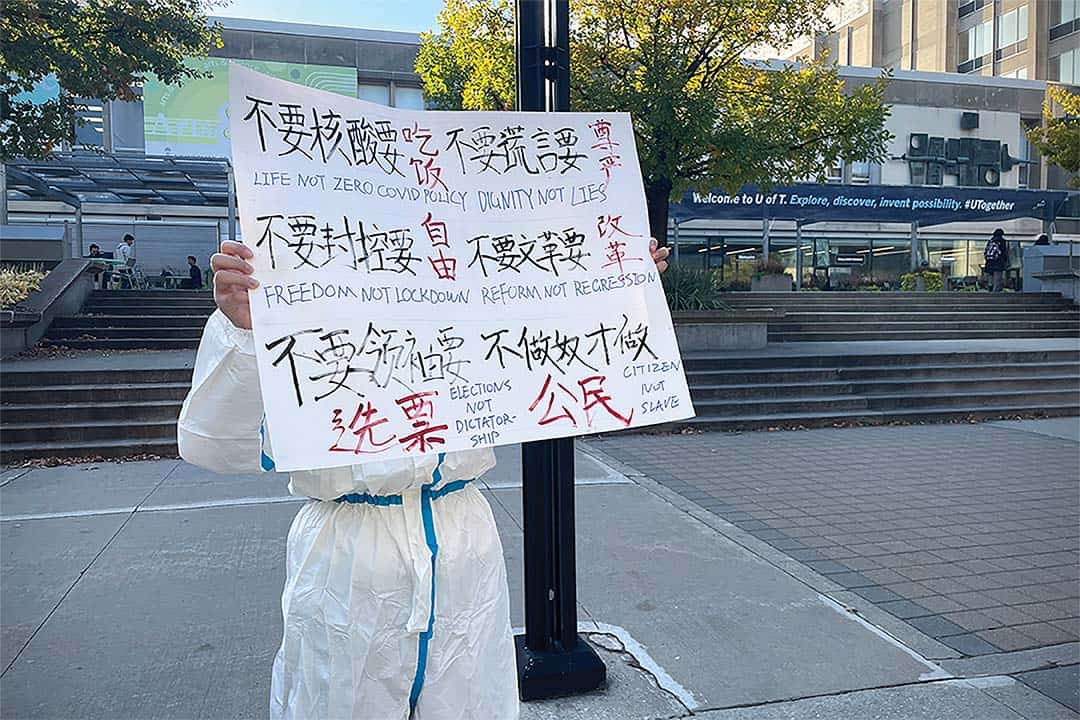On October 21, U of T approximately 25 students gathered in front of Sidney Smith Hall and the Bahen Centre in protest of the Chinese Communist Party’s (CCP) policies. Over the course of the COVID-19 pandemic, the Chinese government has continued to submit its citizens to authoritarian rule at the expense of personal liberties and rights.
Under its “zero-COVID” policy, the Chinese government has shut down its national borders, implemented strict lockdowns on entire cities, and restricted domestic travel in an attempt to reduce COVID cases to zero. These restrictions are combined with other measures to prevent the spread of COVID. For example, in August 2021, this zero-tolerance policy resulted in thousands of healthcare professionals working 24-hour shifts over a 72-hour period to test all 11 million residents of Wuhan for COVID following the discovery of several cases.
On October 13, a lone demonstrator hung banners at Beijing’s Sitong Bridge criticizing China’s “zero-COVID” policy and calling for elections in China. Though the demonstrator, who became known as “Bridge Man,” was quickly arrested, his message generated a wave of international support, including at U of T. Under the name of “U of Ters for the Hero of Sitong Bridge,” students demonstrated in support of Bridge Man and his views. U of T students handed out flyers and talked to passersby, some even dressing in a mock Chinese COVID-19 tester’s uniform in protest of CCP’s policies.
Posters calling for Chinese President Xi Jinping’s resignation and an end to zero-COVID policy have been held up at universities across the world. Many echo the lines hung at Sitong Bridge; “Life not zero-COVID,” “We want freedom, not lockdowns; elections, not rulers,” and “We want dignity, not lies.”
The protest
On June 4, 1989, the largest protest movement against CCP governance was crushed by state authorities at Tiananmen Square. UK documents released in 2017 state that the Chinese army killed 10,000 in the crackdown. According to the BBC, Chinese figures from 1989 place the death count at 200 civilians and several dozen security personnel. Ever since, pro democracy dissidents have struggled to make their voices heard in China. Many dissident groups have relocated overseas, including to Toronto.
During the October 21 event, U of Ters for the Hero of Sitong Bridge called for greater awareness among Chinese students in Canada. A flyer handed out at Sidney Smith calls for readers to inform themselves about the Chinese government’s authoritarian policies. “We shall not respond to one person’s bravery with silence,” it read. The group also chanted “Stop Xi Jinping” and “Fight for freedom” at the demonstration.
One organizer, a fourth-year international relations student who wished to stay anonymous due to safety concerns, spoke to The Varsity: “This protest is hosted by Chinese international students who want to advocate for human rights and democracy in China.”
During the protest, the organizers aimed to “come out and talk to [their] peers” in order to raise awareness about human rights. “To avoid intimidation, we want to show that it is important to speak out and stand out,” the organizer said.
U of Ters for the Hero of Sitong Bridge aimed to mobilize students who might not normally participate in activism. “Chinese international students have always been stereotyped as apathetic or extremely pro-government,” said the organizer, but they believe that many are “putting on a facade” of Chinese patriotism.
Fears of retaliation
Many Chinese international students are reluctant to speak up, fearing consequences for their families that are still living in China. The anonymous organizer told The Varsity that “there have been incidents of students’ [families] being harassed because of their activism.” They noted that these occurrences have a “chilling effect” on the Chinese-Canadian community, deterring them from voicing their opinions in fear of reprisal.
Organizers hoped for further cooperation with U of T student groups in the future, saying that they are open to hosting joint events. They called for student groups to “educate their members.”
The anonymous organizer highlighted the University of Toronto Students Union’s (UTSU) support for their goals. They said the UTSU has “done a fantastic job” at the annual commemoration of the Tiananmen Square Massacre on June 4, and that they should “keep up with the good work.”
Previous UTSU statements have faced criticism for their support of Uyghur and Muslim students. The USTU’s Instagram account was hacked on July 25, when individuals took down a statement condemning Chinese persecution of Uyghurs in Xinjiang province.
“No man is an island,” the anonymous organizer said, echoing a quote by English poet John Donne. “In this time of great darkness and uncertainty, it is imperative that we support each other and elevate each other’s voice.”


